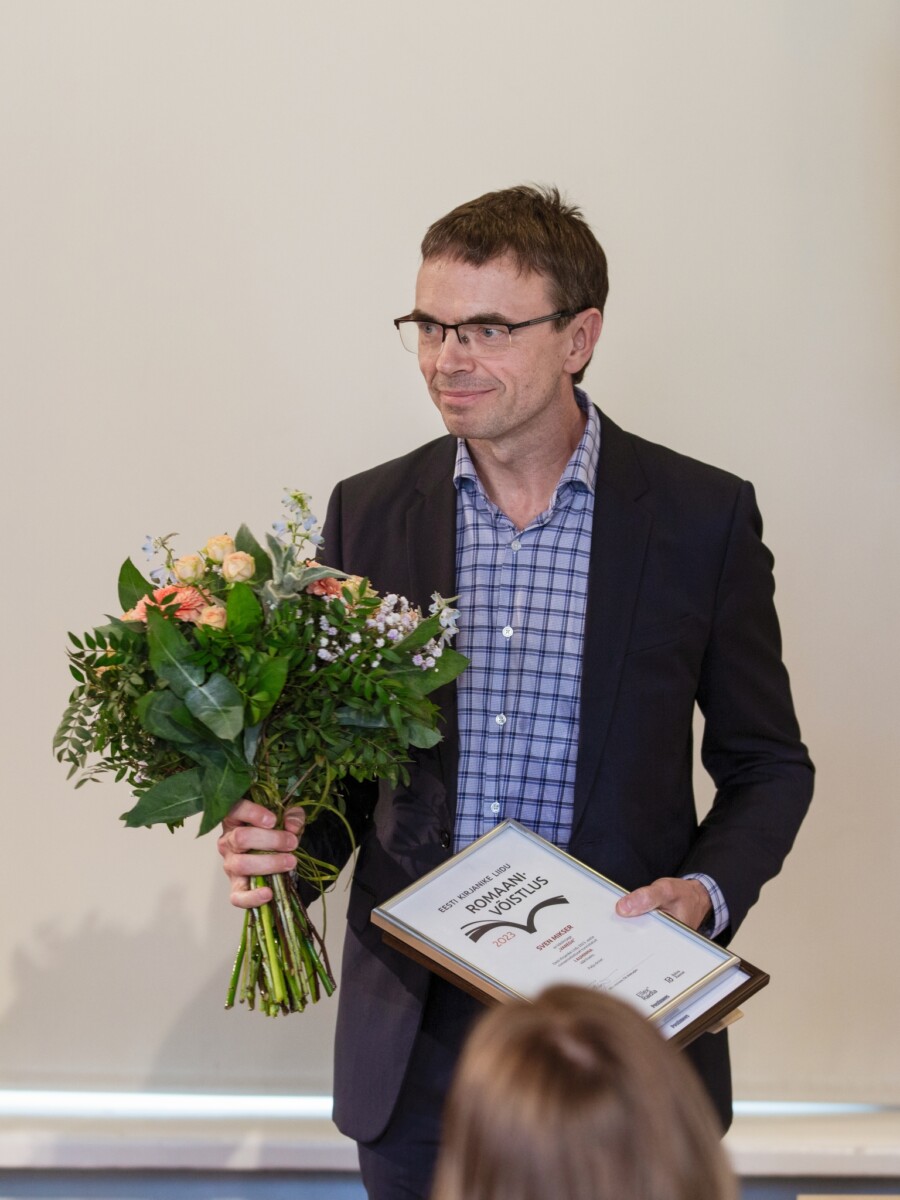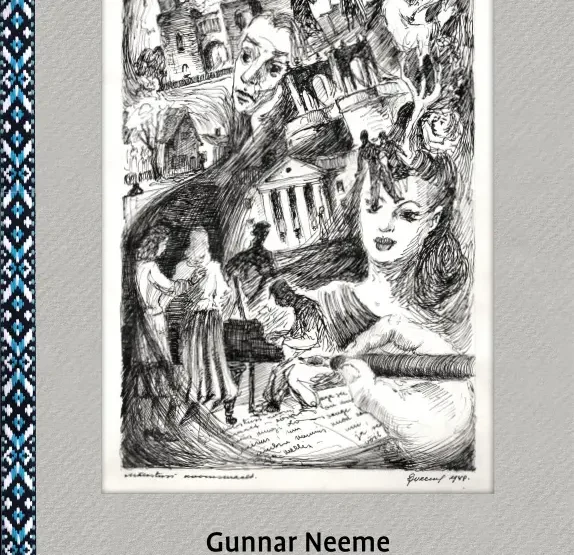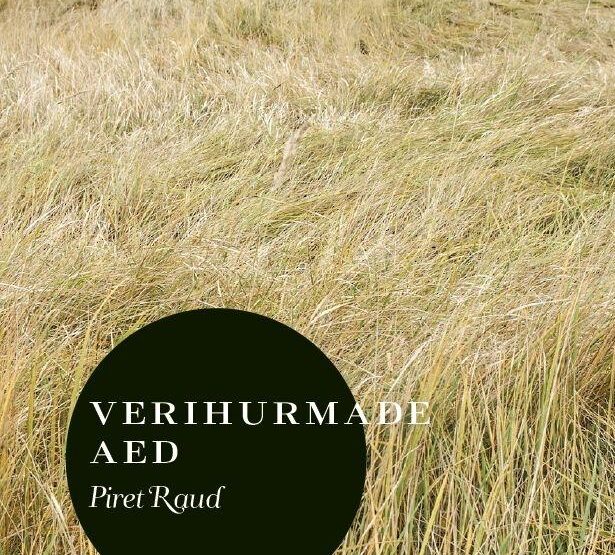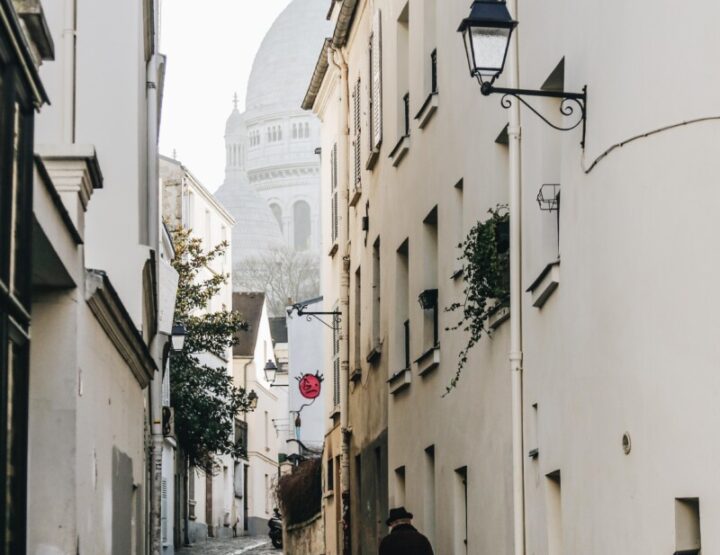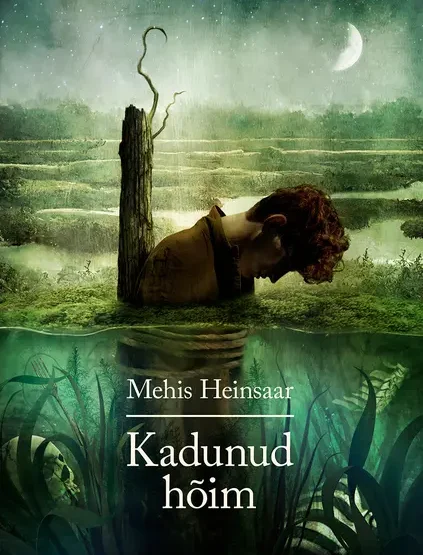And then it’s over. Karel is home that night. He sees me from the kitchen window and comes to the door, eyes wide with excitement and agitation. My heart sinks. He speaks conspiratorially at a half-whisper, and I can’t quite make out the words but, somehow, I already know what he wants to say. Joonas is gone. Dead. Days ago.
I hear the blood rushing in my ears. I’m unable to speak. Karel stands on the stairs and calls out after me. I walk faster and faster until I’m finally running, haphazard and aimless. Not home, I don’t want to go there right now. Joonas is dead. I’m never going to see him again. He’s failed me. How could he do this to me?
As I exit the last glowing circle the streetlights cast onto the pavement, I stop and look around, panting. I’ve made it to the old slaughterhouse on the edge of town and am surrounded by nothing but oppressive late-autumn darkness. I’m doused in sweat. The damp, bitter wind mercilessly penetrates my thin nylon jacket and I suddenly realize that I’m hungry.
The radio crackles as Mom mumbles irritably to herself. She hasn’t noticed me coming in. I stand motionless in the entryway and listen to my heart throb. Greenish light seeps through the clouded flower-patterned glass of the kitchen door, reflecting in the big frameless mirror on the wall. Everything is the same except that Joonas is dead. I don’t know how to grieve him. I’ve never had to do anything like it in the fourteen years I’ve been alive.
Mom manages to tune the old radio more clearly and now I can hear what they’re saying. The Berlin Wall has fallen. People are crowding around the checkpoints. Haven’t you heard? The mayor himself allegedly proclaimed the border’s open to everyone, now!
The soldiers are in disarray, not that anyone could hold back the euphoric masses. Those who can’t squeeze through the gates are putting up ladders brought from home, straddling the concrete wall. Cheering. Some of the more industrious revelers have seized hammers and crowbars to demolish the despised wall right here and now. Mom shakes her head. It’s always the same: champagne and streamers at first, dogs and bullets later.
I gulp, and it sounds as if I’m short of breath.
“Are you crying?” Mom asks, astonished, peering over the frames of her glasses, which have slipped down to the tip of her nose.
She cradles me that night. I don’t speak a word. There’s nothing to say. Mom didn’t know Joonas.
* * *
The painting only comes to mind several days later. No one should ever see it, nobody but me. Maybe it’s already too late. But if it’s still there in his tumbledown cottage, hidden under a dirty rag on the easel, then… I do have a key.
I don’t go home after school. I meander along the narrow side streets until it’s dark enough. Luckily, I don’t have to wander very long. It’s November.
The garden gate creaks. I don’t dare close it properly behind me. I stand stock-still for a few minutes, trying to blend in with the trunk of a towering bare linden. Cozy light filters through the curtains before Karel’s window.
Opening the cottage door is easier said than done. I have to jogle the key back and forth for a while before the lock gives way. It’s pitch-black inside, but I came prepared. The flashlight beam drifts around the space. There it is. Without a moment’s hesitation, I snatch it from the easel and stare at the image of myself, my ragged breath coming out in a whistle.
I don’t really know what I was expecting, but what’s before me is something completely different. There I am, standing naked on the shore and holding a big white seashell in my palm.
There’s no time to study it further. The painting is too big to wedge under my arm and carry home. I try to pry loose the staples holding the canvas to the frame without causing any damage. Several precious minutes tick away due to my hands trembling with fear and nervousness. Impatiently, I gnaw at my bottom lip. What will I say if I’m found out?
But no one enters. With the rolled-up canvas hugged to my chest, I creep out of the cottage. I leave the key in the lock; I won’t be needing it anymore.
The next day after school, I finally have a chance to inspect the painting more closely in daylight while I’m home alone.
Breakers are rolling to shore one after another and somewhere in the distance, the blue of the sea blends with the azure sky. The water sparkles and I can almost hear the screeching of seagulls careening over the frothy crests. Standing at the edge of the water is a boy, barely pubescent, holding a snow-white seashell, skinny and pale, the shadow of a smile on his narrow, compressed lips.
I’m much younger in the painting, that much is obvious. It’s true that I was a late bloomer. I skipped many a swimming class in the spring of fifth grade because I was almost the only boy without a single hair below the belt and felt terrible shame. But years have passed since then, and I can barely remember my bare groin.
I roll the canvas back up and stuff it beneath the bookcase where I keep all my secret things. I’ve got to try to put it out of my mind for good. And Joonas, too, though it’s not easy.
Even so, I manage to pull it off pretty well until one damp and muddy February afternoon when I come home from school and find my mom, with her face blotched and distraught. She sends Krissi to her bedroom and sits me down on the couch. The rolled-up canvas is lying on the coffee table, so it isn’t hard to figure out what’s the matter.
“Did he undress you?”
She shakes me by the shoulder.
“Did he touch you? What did he do to you?”
I jerk free of her grip. An immense wave of agony rises within me. It wells to my throat, a giant formless mass, and spills from my eyes as heavy, salty tears. They stream down my cheeks, but I don’t try to wipe them away.
“No one has touched me. What’s your problem with him? Not even he touched me. Joonas is dead, damn it! Buried. I hope that makes you happy!”
Mom freezes in shock for a moment. Then, she releases something halfway between a sigh and a sob and makes an awkward attempt to hug me, but I push her away.
“It was usually so goddamn cold in that stupid shack of his that I didn’t even take off my sweater. Joonas is an artist. Was an artist. You wouldn’t understand it anyway. You don’t understand anything at all!”
I’ve stopped crying. With almost contemptuous dignity, I pick up the canvas and stuff it back beneath the bookcase. That’s where it stays, and we never mention it again.
* * *
A whole heap of old blankets and some rolled-up red-striped mattresses are in the closet of the old manor entryway, left behind by summer campers. I rummage through them until I find a blanket that’s a little less tattered than the others. It should be fine for sunbathing—the athletic court behind the building is no fancy beach.
I strip down to my underwear and cautiously recline. A few white clumps of clover and pale pink daisies blossom in the neatly trimmed grass by my feet. Mom calls daisies ‘margarets’. Buzzing angrily, a lone bumblebee circles above my head and the sky is so blue that it’s impossible to stare at directly. The air is still and the soil beneath the ocher-scorched grass radiates heat.
Even through closed eyelids, the midsummer sun is unbearably bright. I squeeze my eyes shut even tighter until greenish rings and golden threads appear.
The silence is no longer silence, but a summery potpourri of soft sounds that echo in my ears. Grasshoppers. A bird whistles questioningly a couple of times, warbles, and then falls silent. A light breeze rustles the treetops. I roll over onto my stomach, rest my forehead on my arms, and allow sweet exhaustion to course through my body.
Suddenly, it’s no longer leaves that are rustling. I’m by the sea; Mom and Krissi are here, too. My little sister and I are building a sandcastle on the water’s edge. The sand is coarse and gritty and I’m digging a deep hole with my bare hands. Water seeps into the bottom. Wet sand spills through my fingers and forms delicate towers as it falls. I’m still very young and Krissi is just a tot, maybe three or four years old. She’s patting sand pies and offering me a taste.
I stare out at the sea. The surface glitters and rays of sunlight penetrate the shallow water near the shore and make the sandy seabed glow golden.
Without warning, someone else is there. It’s Joonas. I can’t see him because he’s standing behind me, but his shadow falls onto the water, tremulous, and I hear his calm voice.
“Water is difficult to paint.”
“Harder than a person?” I ask softly, feeling my heart throb.
Krissi and Mom have disappeared. I don’t look over my shoulder because I’m afraid that Joonas might be gone, too. But he’s there, I can still hear his deep, steady breathing.
Apparently, my question goes unnoticed. He’s silent for a while. We both are. Then, he continues speaking, though more to himself, not to me.
“Simply water. Not ships or cliffs, not the shimmer of sunlight on the surface. Simply water. Water is alive and at the same time inanimate. Tranquil and restless. It’s seemingly composed entirely of light, but still ends deep in the darkness.”
In the sand before my feet, golden bands dance alternatingly with shadows. My head starts to spin, and it suddenly feels like I’m staring at the iridescent surface of the water from underneath. I sink deeper and deeper, even though I know I must rise back to the surface at any cost. My arms and legs won’t obey my commands, the light above me dims, and I can’t tell whether the sun is concealed by a cloud or my fading consciousness.
I gasp for air, roll onto my back, and open my eyes. I’m lying on a worn blanket on the bleak athletic court behind Vareda School, and the sea is nowhere in sight. Neither is Joonas. He’s dead. But the shadow that fell over me is real. A dark female silhouette against the radiant summer sky.
“Mom?!”
“Johannes, can you hear me?”
The voice belongs to Margit.
“Are you okay?” she asks in concern, kneeling on the edge of the blanket.
I nod and try to get to my feet, but my vision goes black, and I’m forced to crouch to maintain my balance. Margit rests her hand on my forehead.
“You haven’t gotten sunstroke, have you?”
I shrug. I have no idea what the symptoms of sunstroke are. Margit places her palm between my shoulder blades, and I quiver, unable to tell whether her hand is ice cold or searing hot.
She helps me into the building, explaining all the while. Her high-pitched voice jingles like milk glasses in the sink when Mom washes dishes.
It’s dim and chilly inside. Now, I’m simply cold. I sit on the edge of the couch, trembling from head to toe even though my shoulders and nape are burning.
“You’re redder than a tomato,” Margit says. “We need to rub something on your skin. You don’t have lotion or anything, do you?”
I’m a boy and naturally have no cream anywhere. Margit digs through her olive purse. She shakes her head and spreads her arms.
“Mom puts sour cream on burns sometimes,” I say through chattering teeth, just then noticing that all I’m wearing is a pair of striped blue underwear.
“Do you have some?” Margit asks.
No. No sour cream.
“I’ll go look for something,” she says. “Get dressed in the meantime. You’ll catch a cold.”
Staring out the window, I watch her mount her bike. Gingerly, I wrap myself in a green-checkered wool blanket. It’s rough and pain shoots across my burned skin. Minutes pass. Maybe they are hours.
Finally, she returns.
“Alright. Bring your back over here.”
Margit sets a sand-colored jar down on the table. It isn’t sour cream. I drop the blanket from my shoulders and turn my back to her. Her breath is like a blowtorch on my neck, but maybe it’s just my burnt skin. With extreme caution, she rubs a cooling ointment on my florid body. Her gentle hands make slow circles on my nape and gradually move downward. Then, her slender, limber fingers tiptoe back up my spine like little elf feet, coming to a stop close to my hairline. Just like Mom did when she dressed me in the morning before kindergarten.
“Oh, your ears!” Margit exclaims.
I can feel them burning, too. She dips two fingers into the jar and gently applies the ointment to my earlobes. I let her, even though I could just as well have done it myself.
“Well, that should help,” she concludes, giving my striped underwear a playful slap.
My butt cheeks cramp and sharp pain explodes through my loins.
Translated by Adam Cullen
Sven Mikser (b. 1973) is an Estonian politician, a Member of the European Parliament since 2019, and the former Defense and Foreign Minister of Estonia. A member of the Estonian Social Democratic Party since 2005, he has served as the party chairman, and a five-time representative in Estonian Parliament (first as a member of the Center Party). Mikser graduated from the University of Tartu with a degree in English language and literature. His debut novel Vareda won first place in the Estonian Writers’ Union’s 2023 novel-writing competition.

